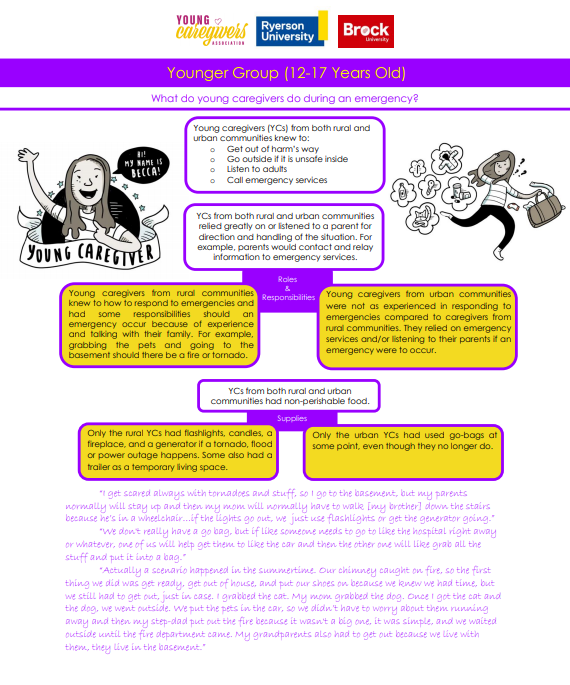Phase 2 Complete! See What Young Caregivers Thought of Our Emergency Planning Video
- Dr. Kristine Newman
- Dec 21, 2020
- 3 min read
Updated: Mar 27, 2024
Phase 2 of the Toronto Metropolitan University (formerly Ryerson University), Brock University, and Young Caregivers Association (YCA) partnership explored the usefulness of a video on emergency planning among young caregives between 12 and 25 years old from both rural and urban communities. Phase 2 was conducted with 16 participants and was split between younger (12-17) and older young caregivers (18-25). Reports of the findings from the two focus groups can be found by clicking the links below.
Report of Findings from Younger Group (12-17)
Report of Findings from Older Group (18-25)
The project team are currently working on their study consisting of three phases. Phase 1 of the study began with focus groups with young caregivers between the ages of 12 and 25. Its purpose was to identify the needs of young carers in rural communities and how these young caregivers' needs differed from their urban counterparts. The study started pre-COVID-19 and didn't originally start out to address emergency planning needs, but the team quickly adapted to align with the needs of the young carers during the pandemic. Without the Young Caregivers Association actively communicating what they were learning from the young caregivers they served, the team would not have been able to respond as quickly as we did. The second phase of the study is going to assess the emergency planning video's impact on young caregivers and look at ongoing challenges with using YouTube as a knowledge sharing platform. Phase 3 is ongoing as well and will give a more detailed exploration of the needs and experiences of young caregivers and their families during COVID-19. The team is hoping to gain some insight into how young caregivers are adapting to school and distance education as well as the impact of new programs like the Canada Recovery Caregiving Benefit.
Phase 1 revealed that, compared to those living in urban communities, young carers in rural areas said Wi-Fi and data was expensive and Google was mainly used for entertainment/distraction, but both groups found online videos to have some value. Participants from rural communities preferred to find and receive information, when it comes to caregiving, through in-person connections, although they still appreciated the usefulness of how-to videos online. Phase 1 of the study also found that young caregivers from both rural and urban communities had privacy concerns with online resources, but trusted YouTube channels with a lot of subscribers. Young caregivers from both rural and urban communities were cautious when using social media platforms like Facebook, Instagram, and Snapchat. Both groups of young caregivers largely chose to use the messaging feature only on these platforms to chat with people they already knew in real life, and not for finding information. They often avoided using other features of social media platforms because of seeing "too much negativity" in posts and comments.
What we have learned from this study is that we need policies and guidelines to include and provide consideration specifically for young carers. Young carers, and those they care for, need reputable resources and services that are communicated to them specifically. They need help to filter information and know what is credible and what is not. YouTube seems to be a viable option for information dissemination. Social media on the other hand, although commonly used, may not be as effective as an avenue for information sharing because young carers only use those platforms for messaging their friends and family members.
The video developed as an outcome of this study, as well as the emergency planning and preparedness resources, can be found here:
Our Team
Dr. Kristine Newman (Principal Investigator), Associate Professor, Toronto Metropolitan University (formerly Ryerson University)
Dr. Heather Chalmers (Co-Investigator), Associate Professor, Brock University
Partner
Michelle Lewis, Director, Young Caregivers Association (formerly Powerhouse Project)
This study was funded by the Social Sciences and Humanities Research Council.




Comments